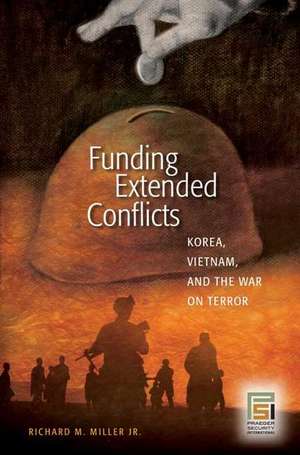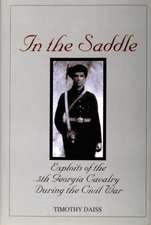Funding Extended Conflicts: Korea, Vietnam, and the War on Terror: Praeger Security International
Autor Richard M. Miller Jr.en Limba Engleză Hardback – 29 aug 2007 – vârsta până la 17 ani
Din seria Praeger Security International
- 18%
 Preț: 334.19 lei
Preț: 334.19 lei - 8%
 Preț: 335.53 lei
Preț: 335.53 lei - 34%
 Preț: 376.10 lei
Preț: 376.10 lei - 46%
 Preț: 443.64 lei
Preț: 443.64 lei - 29%
 Preț: 240.11 lei
Preț: 240.11 lei - 8%
 Preț: 304.56 lei
Preț: 304.56 lei - 34%
 Preț: 373.82 lei
Preț: 373.82 lei - 19%
 Preț: 412.79 lei
Preț: 412.79 lei - 19%
 Preț: 338.42 lei
Preț: 338.42 lei - 18%
 Preț: 335.62 lei
Preț: 335.62 lei - 27%
 Preț: 377.35 lei
Preț: 377.35 lei - 27%
 Preț: 376.75 lei
Preț: 376.75 lei - 18%
 Preț: 336.46 lei
Preț: 336.46 lei - 18%
 Preț: 321.73 lei
Preț: 321.73 lei - 27%
 Preț: 384.51 lei
Preț: 384.51 lei - 18%
 Preț: 320.50 lei
Preț: 320.50 lei - 18%
 Preț: 320.50 lei
Preț: 320.50 lei - 18%
 Preț: 321.35 lei
Preț: 321.35 lei - 24%
 Preț: 420.54 lei
Preț: 420.54 lei - 14%
 Preț: 335.99 lei
Preț: 335.99 lei - 18%
 Preț: 355.82 lei
Preț: 355.82 lei - 18%
 Preț: 319.83 lei
Preț: 319.83 lei - 18%
 Preț: 334.28 lei
Preț: 334.28 lei - 32%
 Preț: 354.48 lei
Preț: 354.48 lei - 14%
 Preț: 335.14 lei
Preț: 335.14 lei - 38%
 Preț: 405.98 lei
Preț: 405.98 lei - 40%
 Preț: 571.34 lei
Preț: 571.34 lei - 18%
 Preț: 321.85 lei
Preț: 321.85 lei - 18%
 Preț: 323.25 lei
Preț: 323.25 lei - 18%
 Preț: 253.28 lei
Preț: 253.28 lei - 40%
 Preț: 571.50 lei
Preț: 571.50 lei - 14%
 Preț: 333.72 lei
Preț: 333.72 lei - 18%
 Preț: 301.73 lei
Preț: 301.73 lei - 19%
 Preț: 352.96 lei
Preț: 352.96 lei - 26%
 Preț: 387.80 lei
Preț: 387.80 lei - 18%
 Preț: 302.77 lei
Preț: 302.77 lei - 14%
 Preț: 333.91 lei
Preț: 333.91 lei - 17%
 Preț: 325.80 lei
Preț: 325.80 lei - 24%
 Preț: 338.58 lei
Preț: 338.58 lei - 34%
 Preț: 414.73 lei
Preț: 414.73 lei - 18%
 Preț: 354.30 lei
Preț: 354.30 lei - 29%
 Preț: 254.29 lei
Preț: 254.29 lei - 18%
 Preț: 354.11 lei
Preț: 354.11 lei - 18%
 Preț: 334.38 lei
Preț: 334.38 lei - 14%
 Preț: 302.68 lei
Preț: 302.68 lei - 18%
 Preț: 322.97 lei
Preț: 322.97 lei - 27%
 Preț: 376.50 lei
Preț: 376.50 lei - 27%
 Preț: 322.81 lei
Preț: 322.81 lei - 27%
 Preț: 382.91 lei
Preț: 382.91 lei - 18%
 Preț: 320.87 lei
Preț: 320.87 lei
Preț: 320.79 lei
Preț vechi: 452.83 lei
-29% Nou
Puncte Express: 481
Preț estimativ în valută:
61.38€ • 64.22$ • 50.99£
61.38€ • 64.22$ • 50.99£
Carte tipărită la comandă
Livrare economică 03-17 aprilie
Preluare comenzi: 021 569.72.76
Specificații
ISBN-13: 9780275998967
ISBN-10: 0275998967
Pagini: 200
Dimensiuni: 156 x 235 x 21 mm
Greutate: 0.46 kg
Editura: Bloomsbury Publishing
Colecția Praeger
Seria Praeger Security International
Locul publicării:New York, United States
ISBN-10: 0275998967
Pagini: 200
Dimensiuni: 156 x 235 x 21 mm
Greutate: 0.46 kg
Editura: Bloomsbury Publishing
Colecția Praeger
Seria Praeger Security International
Locul publicării:New York, United States
Notă biografică
Richard M. Miller Jr., is a serving officer in the U.S. Navy with extensive background in budget issues who most recently worked as a congressional analyst for the Chairman of the Joint Chiefs of Staff. A distinguished graduate of the National War College and the Naval War College, Commander Miller is a winner of the B. Franklin Reinauer Defense Economics Prize. In addition, he was a Federal Executive Fellow in the Institute for the Study of Conflict, Ideology, and Policy at Boston University.
Recenzii
This is a major contribution to the study of US war expenditures. Miller examines US funding of three wars: Korea, Vietnam, and the global war on terror. For each he covers cost estimates and appropriation, allocation, and spending. He tries to place the material in context by preceding each introduction with a caption from a prominent source. Miller clearly explains the funding process in each case study and raises many questions, which he answers with healthy cynicism. One conclusion is that all estimates depend on assumptions; hence, they all end up wrong. Supplemental funding has been significant, incremental, and expensive in terms of opportunity costs. In discussing resources, Miller considers 12 serious issues including cost estimates, transition from supplemental to baseline budgets, advantages and disadvantages of supplemental budgeting, benefits and durability of flexible appropriations, importance of authorities relative to funding, cost components, overtime, predisposed outlook of the political leaders, congressional activism, and tensions and suspicions surrounding war expenditures.. Charts, tables, glossary, footnotes, plus introductions and summaries of chapters and sections enrich the text. Highly recommended. Upper-division undergraduate students through professionals.
Miller, a serving officer in the US Navy with extensive economic and budgetary experience at the national level, uses the extended conflicts in Korea and Vietnam as case studies as he describes the fundamentals of financing and budgeting for war and problems in defining war costs. He examines the Korean War from 1951 to 1953, defining the security strategy and the supplemental financing requests built from it, the war in Southeast Asia from 1965 to 1975 and the record of spending, and the war that will likely top them all in cost, that on terror starting in 2001, including homeland security since 9/11. He gives 12 elements to consider in creating financing and budgets for upcoming wars.
Miller, a serving officer in the US Navy with extensive economic and budgetary experience at the national level, uses the extended conflicts in Korea and Vietnam as case studies as he describes the fundamentals of financing and budgeting for war and problems in defining war costs. He examines the Korean War from 1951 to 1953, defining the security strategy and the supplemental financing requests built from it, the war in Southeast Asia from 1965 to 1975 and the record of spending, and the war that will likely top them all in cost, that on terror starting in 2001, including homeland security since 9/11. He gives 12 elements to consider in creating financing and budgets for upcoming wars.














